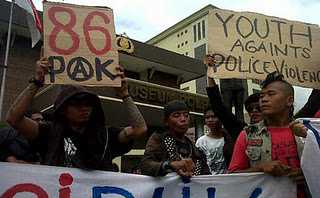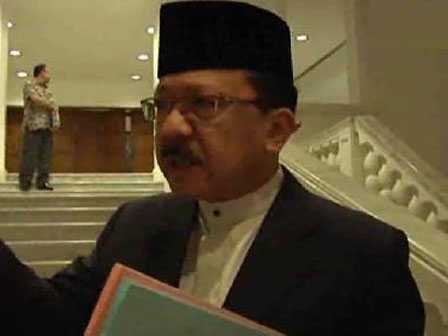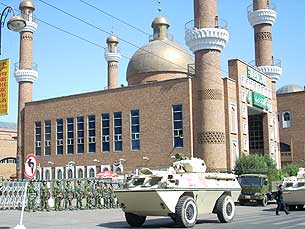Contributed by: aforum
On the 11th of December 2011, in the very conservative and religious province of Aceh in Indonesia, 64 punks who were attending a punkrock show, were arrested and taken to jail without any criminal charges whatsoever. The only reason for them to be victim of that totally arbitrary state repression was that they are punks. The police shaved their hair off and removed their piercings, their clothes were taken away from them, replaced by “decent” ones and they were forced to wash themselves in a “religious ritual”. Then they were brainwashed and “re-educated” for ten days through “religious education” and “military discipline”.
Solidarity action in Istanbul/Turkey for the 64 punks arrested in Aceh/Indonesia
On the 11th of December 2011, in the very conservative and religious province of Aceh in Indonesia, 64 punks who were attending a punkrock show, were arrested and taken to jail without any criminal charges whatsoever.
The only reason for them to be victim of that totally arbitrary state repression was that they are punks. The police shaved their hair off and removed their piercings, their clothes were taken away from them, replaced by “decent” ones and they were forced to wash themselves in a “religious ritual”. Then they were brainwashed and “re-educated” for ten days through “religious education” and “military discipline”.
Against this outrageous police action, solidarity actions and demonstration took place in Moscow, London, San Francisco, Los Angeles, China and Malaysia.
On the 24th of December a solidarity concert for the Indonesian punks was organized in Istanbul with the Hardcore/Punk bands POSTER-ITI and FRANKENSTEIN to inform people and gather supporters for the protest on the following day.
On the 25th of December at 3:00 in the afternoon, as a sign of solidarity with the “Aceh 64”and as a reaction to this ultra-repressive measure of the Indonesian state, 30 punks and anarchist activists attacked and vandalized the outside walls of the “Indonesian Consulate General” located at “Seneryildizi Sokak, No. 22/11 Etiler” in Istanbul, Turkey.
While playing punkrock music with a portable sound system, those 30 activists spray-painted the consulate with slogans saying: ”Dinleriyik Yoket (Abolish all Religions)“, “Free Aceh Punx”, “ACAB”, “Punklar burda (The Punks are Here)” and “Özgur Kal (Stay Free)”. The doors were covered with stickers and graffiti and two large banners were hung on the consulate walls saying: ”Free the Indonesian Punks” and “Bütün Devletler Fasittir, Polisler kiralik Katil (All governments are fascist, all cops are assassins)”. Afterwards a small but loud demonstration took place in the very rich and elitist vicinity of the consulate in support of the 64 Indonesian punks, expensive cars were decorated with anarchist symbols and some vandalism occurred until the 30 activists dispersed and vanished.
There was no interference with the police whatsoever and fortunately nobody was arrested.
Flyer that distributed during action:
In the region Aceh in Indonesia, 65 punks were put into police custody without any criminal charges.
They were arrested just for being different. The police shaved their hair off and removed their piercings and they will now be brainwashed through “religious education” and “military discipline”.
We strongly protest against this new fascist attempt to oppress and punish everybody who does not want to fit into their disgusting capitalist mainstream. State repression and police brutality is getting worse and worse every day worldwide and we are sick of it. We will fight back.
WE MIGHT BE FEW BUT WE STAND TOGETHER!
———————
What happened in Aceh?
After years of war and the devastation of the 2004 tsunami, a peace process was started which resulted in considerable autonomy for Indonesia’s northernmost province. Former GAM fighters won the elections. One of the changes they brought in was a form of Islamic Syaria’h law, which is not enforced in any other part of Indonesia. Currently Aceh is in the run-up to new elections and different candidates are pitching their image to the public.
In nearly all parts of Indonesia there is a large punk scene. Many young homeless kids are attracted by the music and the lifestyle and can support each other in many ways, forming a subcultural community. Indonesian punks often earn a living by busking on buses or at traffic lights, and travel the country for free, hitch-hiking on the back of trucks. But at concerts, which are usually free or cheap and organised according to DIY ethics, people from all backgrounds come along.
The concert on 10th December 2011 was a benefit gig to raise money for orphans. Apparently the event started at about 3pm and it was supposed to continue into the night. but at 21.30, police climbed onto the stage and demanded that the event should finish. The people there tried to negotiate for the gig to continue, but the cops didn’t seem to care. Reacting to the cops’ behaviour, the punks started singing a popular resistance song, Darah Juang (blood of struggle), but as it happened, that song seemed to provoke the anger of the cops who then started beating people and arresting them.
The arrested punks were taken to the Seulawah National Police School one hour from Banda Aceh city. That’s where their hair was shaved off and they were forced into the lake. Punks in Aceh who weren’t arrested have found it difficult to get any communication with their friends, because it seems they are in isolation.
Worldwide solidarity actions:








